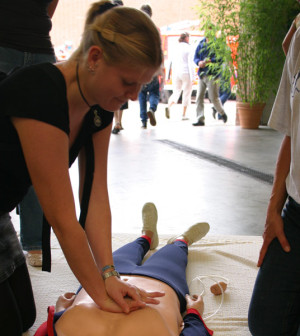- Could Your Grocery Store Meat Be Causing Recurring UTIs?
- Are You Making This Expensive Thermostat Error This Winter?
- Recognizing the Signs of Hypothyroidism
- 10 Strategies to Overcome Insomnia
- Could Artificial Sweeteners Be Aging the Brain Faster?
- Techniques for Soothing Your Nervous System
- Does the Water in Your House Smell Funny? Here’s Why
- Can a Daily Dose of Apple Cider Vinegar Actually Aid Weight Loss?
- 6 Health Beverages That Can Actually Spike Your Blood Sugar
- Treatment Options for Social Anxiety Disorder
Irregular Heartbeat May Be Deadly in Car Crash

Having the common heart rhythm disorder atrial fibrillation might be risky if you get into a car accident, a new study suggests.
Atrial fibrillation is a quivering or irregular heartbeat. Researchers report the condition is linked to higher chances of dying if you’re in a crash, although their study didn’t prove a cause-and-effect relationship.
“Atrial fibrillation is the most common heart rhythm disorder, and incidence is rising. Many of these patients are on anticoagulants to lower their stroke risk, but these drugs increase the chance of bleeding,” said study author Dr. Abhishek Deshmukh, a cardiologist at the Mayo Clinic in Rochester, Minn.
However, “we should not jump the gun and advise patients with atrial fibrillation to stop driving. This was a retrospective observational study and needs to be confirmed by further research,” he said in an European Society of Cardiology news release.
In the study, Deshmukh and his colleagues analyzed data from nearly 3 million drivers, passengers and bystanders who were involved in a traffic crash and admitted to U.S. hospitals between 2003 and 2012. Of those patients, 2.6 percent had atrial fibrillation.
Death rates were 7.6 percent for those with atrial fibrillation and 2.6 percent for those without the condition. After adjusting for factors such as age, gender, injury severity and existing health problems, the researchers still found crash victims with atrial fibrillation had a 1.5 times higher risk of dying in the hospital than those without the disorder.
The researchers also found that the average hospital stay after a traffic crash was nine days for those with atrial fibrillation and only six days for those without the condition. The average cost of hospital stay was $28,217 for those with atrial fibrillation, and $19,615 for those without.
“There is limited information about the impact of atrial fibrillation on daily activities such as driving. This is the first study to investigate the effect of atrial fibrillation on death and length of hospital stay after a motor vehicle accident,” Deshmukh said.
“Atrial fibrillation is associated with higher mortality, length of stay and cost when patients are hospitalized for bypass surgery, hip replacement or heart failure. Our research shows that atrial fibrillation is also associated with worse outcomes in patients involved in motor vehicle accidents,” Deshmukh said.
The study was to be presented Friday at a cardiology meeting in Nice, France. Research presented at medical meetings is considered preliminary until it is published in a peer-reviewed journal.
More information
The U.S. National Heart, Lung, and Blood Institute has more about atrial fibrillation.
Source: HealthDay
Copyright © 2026 HealthDay. All rights reserved.










